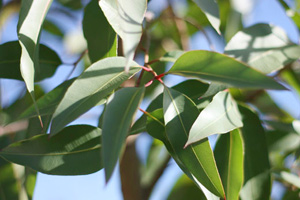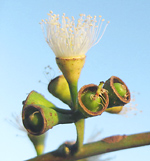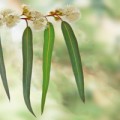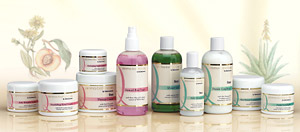Lemon Eucalyptus Essential Oil
 Lemon eucalyptus essential oil is obtained from the fragrant leaves of the Eucalyptus citriodora tree, and unusually, this particular oil is referred to by its botanical name almost as much as its common name in aromatherapy by therapists.
Lemon eucalyptus essential oil is obtained from the fragrant leaves of the Eucalyptus citriodora tree, and unusually, this particular oil is referred to by its botanical name almost as much as its common name in aromatherapy by therapists.
Although this essential oil is not as popular in aromatherapy as the ubiquitous Eucalyptus globulus, it is fast growing in reputation due to its powerful bactericidal and insect repellent properties.
Eucalyptus citriodora is one of the most popular eucalyptus trees grown throughout Melbourne in Australia, which is its native country. This species is believed to have originated from a restricted area of Queensland on the Tropic of Capricorn, and is now found growing throughout the world’s tropical climates.
General description
Commonly known as the lemon scented gum tree in its native country, lemon eucalyptus is a fast-growing stately evergreen growing 25 to 40 metres high, sometimes reaching 50 metres (165 ft) when growing wild. It has a variable form but typically presents a sparse, pendulous crown of narrow lanceolate leaves that are strongly lemon-scented.
The usually smooth, pale-grey trunk turns salmon-pinkish prior to its annual shedding and develops a powdery bark that peels off in thin irregular patches or curling flakes, becoming mottled and exposing a whitish or faintly bluish inner layer that appears dimpled.
Geographical sources
Although large quantities of lemon eucalyptus essential oil were distilled in Queensland during the 1950’s and 1960’s, very little of this oil is produced in Australia today. The largest producing countries are now Brazil, China and India, with smaller quantities originating from South Africa, Guatemala, Madagascar, Morocco and Russia.
Traditional uses
All species of eucalyptus leaves have been used in traditional Aboriginal bush medicine for thousands of years. Infusions made of lemon eucalyptus leaves were taken internally to reduce fevers and ease gastric conditions, and applied externally as a wash for the analgesic, anti-fungal and anti-inflammatory properties. Aborigines would make leaves into a poultice and apply them to ease joint pain and speed up the healing of cuts, skin conditions, wounds and infections.
Respiratory infections, colds and sinus congestion were treated by inhaling the vapours of steamed leaves, and to treat rheumatism the leaves were made into beds or used in steam pits heated by fire. The therapeutic qualities of the leaves and its essential oil were eventually introduced and integrated into many traditional medicine systems, including Chinese, Indian Ayurvedic and Greco-European.
Harvesting and extraction
In Brazil, leaf harvesting may take place twice a year, whereas most of the oil produced in India comes from smallholders who harvest leaves at irregular times, mostly depending on convenience, demand, and oil trading prices.
After collection, the leaves, stems and twigs are sometimes chipped before quickly loading into the still for extraction by steam distillation. Processing takes approximately 1.25 hours and delivers a yield of 1.0% to 1.5% of a colourless to pale straw coloured essential oil. The odour is very fresh, lemon-citrus and somewhat reminiscent of citronella oil (Cymbopogon nardus), due to the fact that both oils contain high levels of the monoterpene aldehyde, citronellal.
Benefits of lemon eucalyptus essential oil
Lemon eucalyptus essential oil is powerful fungicidal and bactericidal, and is most commonly used to obtain relief from a wide range of respiratory conditions such as asthma, sinusitis, phlegm, coughs and colds, as well easing sore throats and laryngitis. This makes it a highly valuable oil at this time of year when viruses are on the increase, plus its delightful lemony aroma is much nicer to use than some other antivirals such as tea tree.
When used in an aromatherapy diffuser, lemon eucalyptus oil has a reviving and refreshing action that uplifts, yet is also calming to the mind. It also makes an excellent insect repellent and can be used alone or in blends with other respected insect repellent essential oils such as citronella, lemongrass, cedar atlas etc. It is a powerful fungicidal and bactericidal that has been scientifically evaluated many times against a wide range of organisms.
Lemon-scented eucalyptus oil is a top note and blends well with basil, cedarwood virginian, clary sage, coriander, juniper berry, lavender, marjoram, melissa, peppermint, pine, rosemary, thyme and vetiver. In natural perfumery it can be used successfully to add a fresh, slightly citrusy-floral top note to blends, but use it sparingly as it is very diffusive and easily dominates in blends.
Browse Quinessence Lemon Eucalyptus Essential Oil
Copyright © Quinessence Aromatherapy Ltd 2022.

 Eucalyptus is derived from the Greek words eu and kaluptos which mean ‘well covered’ and refers to the cup-like membrane which covers the stamens before they emerge as fully developed flowers.
Eucalyptus is derived from the Greek words eu and kaluptos which mean ‘well covered’ and refers to the cup-like membrane which covers the stamens before they emerge as fully developed flowers.





























